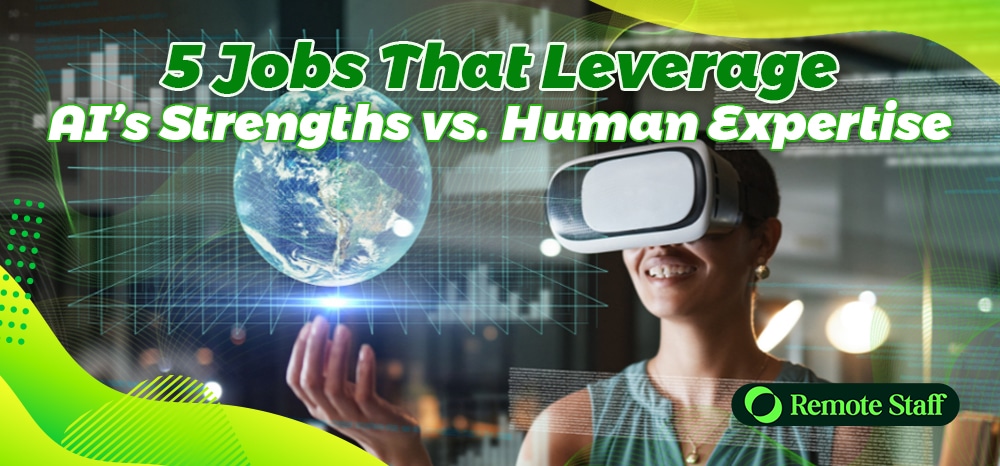Many people worry that artificial intelligence (AI) jobs will take over their work in a few years- especially after tech companies cut thousands of jobs earlier this year.
True enough, AI has transformed how we communicate, work, and live. It automates repetitive tasks, allowing individuals and organisations to shift their focus and energy to more complex (and more rewarding) activities that require critical thinking and creativity.
However, despite its advancements, some jobs remain better suited for humans. AI still struggles with tasks that rely on emotional intelligence, critical thinking, and complex social interactions.
Thus, while AI might replace some jobs, it will also give rise to others – and leave a surprising handful where humans still have the upper hand.
Let’s take a look.
The Rise of AI in the Human Workforce
Most people became familiar with AI when ChatGPT gained popularity in the past few years. However, the foundation for AI goes back as far as the early 1900s, with significant progress occurring in the 1950s.
Currently, artificial intelligence is widely used in websites, search engines, mobile phones, and social media. It has also progressed to cover coding, writing, and design, which has raised concerns about job security for creatives.
Hybrid Intelligence: The Reality Behind “Pure” AI Claims
Many people fear AI will replace human beings before long. However, the concept of “pure” AI,” where machines work completely on their own without human input, remains mostly theoretical.
While today’s AI systems are powerful, they still rely heavily on human expertise and machine learning algorithms. They need large amounts of data, careful training, and human intervention to perform at their best.
For example, GPT-4 still requires data curation, algorithm design, and continuous refinement – all products of human effort – to function effectively. In other words, AI systems, despite their advanced capabilities, can’t fully function independently.
Without humans, AI systems would lack direction and purpose.
Understanding the Role of AI in Modern Workplaces
Artificial intelligence has become essential in many industries, providing AI benefits. It helps organisations in various sectors optimise their processes, particularly in delivering quality services to their target customers:
- Customer Service – AI-driven chatbots offer instant support to customers by answering frequently asked questions (FAQs) and resolving common issues without requiring human intervention.
- Manufacturing – Production companies use AI-driven systems for automated quality control. This significantly reduces human error and ensures products consistently meet high standards.
- Finance – In the finance sector, AI algorithms analyse market trends and consumer behaviour. This aids and speeds up decision-making and improves risk assessment.
The Human Touch: Why Some Jobs Still Need Us
While AI is undeniably useful in eliminating repetitive tasks, there are still certain skills and qualities that robots and machines cannot replicate.
Creativity, for example, is a uniquely human trait that AI has yet to fully master.
Although AI can generate art based on prompts and patterns, these illustrations lack the ability to draw inspiration from personal experiences, emotions, and cultural nuances.
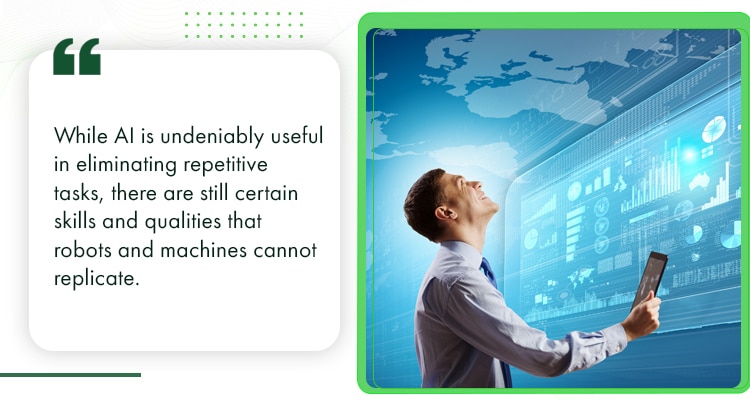
Moreover, AI struggles to replicate empathy.
Humans have an innate ability to connect with others and understand their feelings, even without prompts. This enables them to provide support in ways that machines cannot.
However, technical jobs that involve routine tasks, complex processing, and predictions are best performed with the assistance of artificial intelligence.
5 Jobs Reaping the Rewards of Artificial Intelligence
The following jobs require technical skills where efficiency, accuracy, and speed are crucial, thus giving AI the edge:
#1. Data Analysis and Processing
Data analysis involves transforming raw data into usable information, requiring strong analytical and numerical skills. While humans can perform this task, their ability to simultaneously process massive data sets is severely limited and is often prone to errors.
This is where AI comes in. Its ability to process vast amounts of data quickly and accurately makes it ideal for various industries where quick decision-making is crucial:
- Finance – AI algorithms analyse historical market data to identify trends, evaluate risks, and predict stock movements. This enables traders to make informed decisions in real-time.
- Marketing – In marketing, AI tools can quickly analyse consumer behaviour and preferences. By examining factors like browsing history, purchasing patterns, and social media interactions, it’s better equipped to predict what consumers are likely to buy and when.
- Logistics – AI systems can also forecast demand, optimise routes, and manage inventory levels more efficiently than humans can.
For example, it can analyse traffic patterns, weather data, and historical shipping records to recommend the most efficient delivery methods at any given time.
#2. Repetitive Manufacturing and Assembly Line Work
Production and manufacturing industries involve plenty of repetitive tasks, like assembling car parts, electronics, or consumer goods.
As there’s little to no variety in the process, machines are often used to boost efficiency and accuracy, with a few workers overseeing the production line.
On the other hand, an assembly line is used in factories where a product moves down a line and workers assemble it by hand in different phases.
This method is common in mass production, like car manufacturing, where parts are added step by step until the final product is complete.
So, what role does AI have here?
AI-powered robots now handle many of these repetitive tasks. Unlike human workers that might get tired or sloppy after long hours of sitting or standing, robots can work nonstop without losing efficiency. They also:
- Improve Accuracy – AI-powered robots perform tasks with high precision, ensuring each part is placed correctly. This is crucial in electronics and car manufacturing, where small assembly mistakes can result in accidents, major defects, or costly recalls.
- Enhance Quality Control – Advanced sensors and machine learning can also detect tiny flaws in products that humans might miss.
- Operate Complex Machinery – AI can adjust parameters in real-time based on data input. It adapts to changing conditions more quickly and efficiently than humans, particularly when operating complex machinery.
#3. Customer Service and Support Chatbots
For a long time, customer service was handled by human employees who responded to inquiries, complaints, and FAQs. However, the rise of artificial intelligence has enabled virtual support chatbots to take over these tasks.
They respond to common questions and complaints 24/7. Natural language processing (NLP) enables AI to understand, interpret, and respond to human language in a natural and intuitive way.
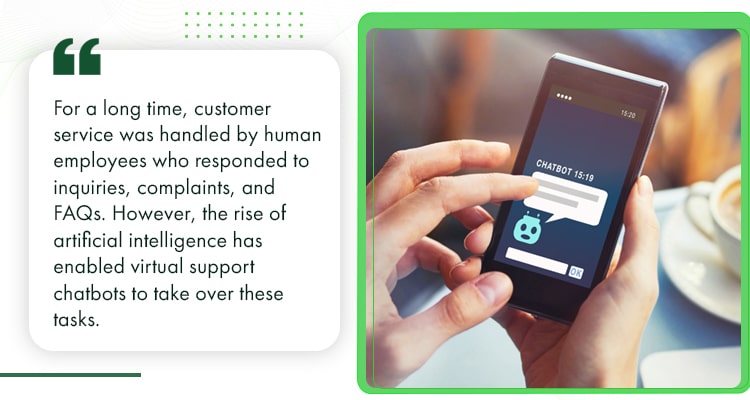
For example, if a customer asks about a product’s availability or needs help with an order, the chatbot can quickly look up the information from the company’s database. This allows customers to get the information they need right away.
With AI chatbots handling FAQs, human support teams can concentrate on more complex or sensitive issues. They can use their time and skills on inquiries that need empathy and critical thinking, ensuring customers get the best support for their more challenging concerns.
#4. Predictive Maintenance and Equipment Monitoring
Skilled mechanics can often estimate how long a car can run properly before it breaks down, but not with complete certainty. In contrast, artificial intelligence can now handle predictive maintenance and equipment monitoring more efficiently.
Predictive maintenance aims to anticipate equipment failure and prevent them through timely maintenance. Similarly, equipment monitoring assesses and diagnoses faults, leading to preventive or corrective actions.
Implemented effectively, these practices improve safety and optimise performance monitoring equipment, especially with the use of AI.
Artificial intelligence uses machine learning algorithms to identify patterns and anomalies that show potential issues. This allows companies to address problems before they escalate into costly failures.
Let’s take a look at some examples:
- Aviation – Airlines use AI to monitor aircraft systems in real time, predicting when components may fail and scheduling maintenance accordingly.
- Automotive Industry – AI also helps car manufacturers optimise production processes by predicting equipment malfunctions, leading to significant savings in repair costs and reduced production delays.
- Energy Sector – Power plans and grids use AI to prevent unexpected outages that could have serious economic repercussions.
#5. Medical Imaging and Diagnosis
Radiologists use medical imaging to interpret X-rays, MRIs, and other scans manually, helping doctors make better-informed treatment decisions.
However, AI systems can now analyse large amounts of medical data. With deep learning, AI can detect patterns more accurately, identifying anomalies like tumors, fractures, or underlying signs of impending disease.
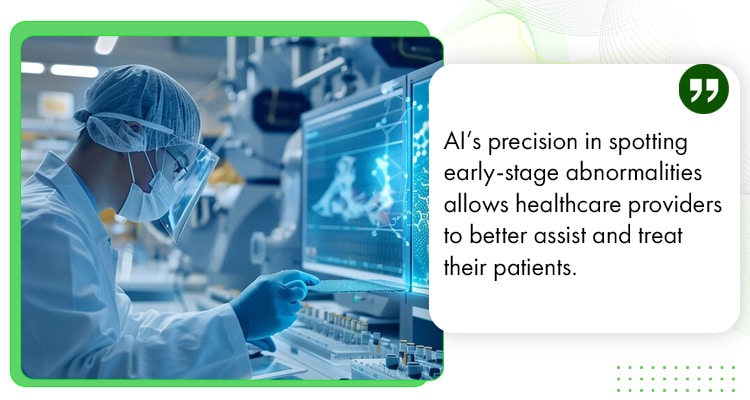
This ability to process large volumes of images leads to faster and more efficient diagnoses. Additionally, AI tools can prioritise critical cases, helping radiologists manage their increasing workload.
AI’s precision in spotting early-stage abnormalities allows healthcare providers to better assist and treat their patients.
5 Jobs Where People Outshine AI
While AI transformation can take over many technical and routine tasks, certain roles are still best handled by humans, particularly creatives and strategists.
These include:
#1. Creatives (Writers, Artists, and Designers)
Art is the expression of human creativity and imagination. Throughout history, it’s been drawn from human experiences, ideals, and stories.
While AI tools can generate designs from prompts, the true talent and skill to create something unique and distinct from scratch remain exclusive to humans.
Art is valued for the artist’s struggle to interpret the world around them. For example, Vincent van Gogh’s Starry Night was inspired by the view from his window while he was confined at the asylum of Saint-Paul-de-Mausole in Southern France.
His personal battle with mental illness is reflected in the painting, capturing his emotional state during that period. If the element of struggle or personal experience is removed from the artistic process, the essence and meaning of art are significantly diminished.
Additionally, jobs that involve storytelling and artistic expression are still better suited as human jobs.
- Writing – Writers, for instance, draw from personal experiences and their ability to connect with audiences.
While AI can write well-structured articles, it can often lack the warmth and nuance that human insights provide. Creativity thrives on spontaneity. In contrast, AI relies on predefined algorithms, often resulting in repetitive output.
- Creative Media – Furthermore, novelty is necessary in fields like advertising, film, and music. These industries require original, thought-provoking work that resonates with audiences, which can best be achieved by someone who shares the same human experiences.
#2. Therapists and Social Workers
Humans crave connection. This makes counselors and social workers essential, especially for those dealing with trauma, grief, addiction, attachment, or relationship issues.
At best, artificial intelligence can offer definitions or a list of possible solutions to these problems. However, these fields demand more than just problem-solving.
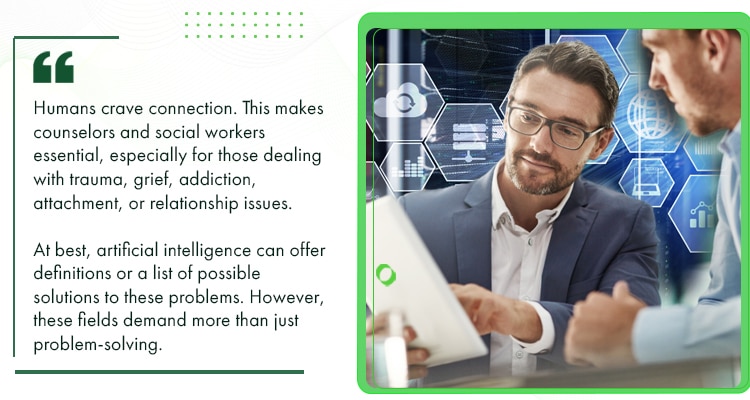
Counselors and social workers are good at building trust and understanding complex human emotions and interpersonal dynamics. They also interpret body language and non-verbal cues – abilities that AI cannot replicate.
While AI can assist with administrative tasks, it can’t replicate the depth of understanding or emotional support that human counselors and social workers offer. Machines can’t respond to subtle emotional cues or unspoken concerns, which are critical aspects of a therapist’s or counselor’s work.
Thus, these roles will remain deeply human-centered – as they should.
#3. Strategic Decision-Making Roles
Leadership and management roles remain best suited for humans. Artificial intelligence can aid and inform decision-making but it can’t replace human foresight, intuition, and ethical considerations.
Policymakers and management consultants, for instance, need to study nuances before implementing laws and regulations. They must examine these amidst complex contexts, particularly in uncertain or ambiguous situations, before making decisions – employing a balance of rational, emotional, and critical thinking.
Rather than relying on data and numbers alone, leaders also have to consider how their choices will affect employees, customers, and communities.
This can’t be done by AI since it lacks the moral compass to navigate complex and novel ethical dilemmas, making human judgment indispensable.
#4. Healthcare Providers (Nurses and Doctors)
Human doctors and nurses also remain irreplaceable. Caring for sick patients requires compassion and empathy aside from technical knowledge.
In other words, compassion remains at the heart of healthcare. Patients often feel scared, anxious, or uncertain about their health conditions, which doctors and nurses are trained to alleviate on the job.
Thus, healthcare professionals, especially doctors, must have good bedside manners. They need to explain complex medical information in a way that suits the patient’s level of understanding. This personalised approach encourages open dialogue, allowing patients to express their concerns or treatment preferences.
At most, AI can assist with diagnostics (as mentioned earlier), but patient care itself should remain the responsibility of human healthcare professionals. After all, empathy remains essential to the healing process – a distinctly human trait that no AI can ever replicate.
#5. Education and Training Professionals
Educators have the power to shape minds, helping individuals grow into professionals who contribute to society. However, the role goes beyond simply delivering facts, dates, and concepts for students to memorize.
The teaching and mentoring profession requires creativity, adaptability, and the ability to inspire students. Every student has a unique learning style, pace, and set of needs. This is where teachers come in.

Good teachers can easily adjust their methods based on classroom dynamics, emotional cues, and individual challenges. While AI can provide information, it cannot intuitively read the room or shift teaching methods according to students’ needs.
Frequently Asked Questions (FAQs)
Here are some of the frequently asked questions about AI and its impact on job opportunities:
FAQ #1: How Can Employees Secure the Future of Jobs in The Age of AI?
The use of AI is inevitable.
Employees have no choice but to learn how to adapt, like familiarising themselves with relevant AI tools and software in their fields.
Understanding how AI works will help them be more productive and efficient in their jobs. They also have to enhance skills that AI cannot replicate, such as leadership, communication, teamwork, empathy, and emotional intelligence.
These soft skills are becoming increasingly valuable, as companies seek leaders and self-starters rather than just employees who can perform administrative tasks that AI does better.
FAQ #2: Can AI Help Create New Job Opportunities Rather Than Just Replacing Them?
Yes! AI has also led to new career paths, including the following AI jobs:
- Prompt engineers;
- AI trainers;
- Machine learning engineers;
- AI ethics specialists;
- Cybersecurity researchers;
- AI support specialists;
- Natural language processing engineers; and
- AI research scientists, among others.
There are many opportunities to leverage AI and explore different fields. With the right knowledge, skills, and determination, AI can serve as a starting point for a new career path.
Conclusion
Artificial intelligence, like computers, should be treated as tools that help humans work more efficiently. Therefore, it’s important to understand how it works and how it can provide the most value.
 While AI threatens jobs that carry out repetitive tasks, it also encourages individuals to pursue strategic and fulfilling careers that require uniquely human skills, such as empathy, critical thinking, and creativity.
While AI threatens jobs that carry out repetitive tasks, it also encourages individuals to pursue strategic and fulfilling careers that require uniquely human skills, such as empathy, critical thinking, and creativity.
At the end of the day, it’s about recognising how AI and human skills complement each other. People can and should use AI to simplify tasks – so that they can fulfill their (and their company’s) potential better and faster.
Looking for business-related AI prompts but don’t know where to start? Click here.
Click here if you’re looking for world-class remote workers for your business.
If you’re ready to experience the full advantages of working with a top global team, check out our 1,000 fully vetted and highly talented staff here.
Syrine is studying law while working as a content writer. When she’s not writing or studying, she engages in tutoring, events planning, and social media browsing. In 2021, she published her book, Stellar Thoughts.

